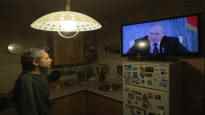The most difficult challenge for Russia’s war censorship is foreign social media companies, which Russia cannot command, writes ‘s foreign journalist Mika Mäkeläinen.
The better on the Ukrainian front, the more good news will appear on Russia’s home front. And when things go wrong, Russia should either silence the media or lie to the people.
If anything can be deduced from Russia’s media silence, then Russia is doing worse than planned in Ukraine, at least.
The Russian media is on a tight flame of the state even in normal times, but the war has further tightened grips.
The media that used the wrong words received a warning letter from the authorities yesterday. The warning was issued on Saturday to Eho Moskvy radio station and Novaja Gazeta, whose editor-in-chief Dmitry Muratov received the Nobel Peace Prize last year.
With less traditional media discipline has survived Russia’s best-known search engine Yandex, which only transmits online content to readers.
However, under official pressure, it added a “false information” warning to its Russian-language search results. The different thing, then, is how false or right the search results that warn Russians are really about.
Russia controls television stations the most, which are the main source of news for most.
Hacker group Anonymous (switch to another service) however, suffered a crackdown on war news controlled by the Kremlin on Saturday. It says it has for a moment taken over the broadcasting stream of state television channels and replaced it with the “truth” of the war in Ukraine.
The most difficult challenge for Russia’s war censorship are foreign social media companies that Russia cannot command. So Russia has restricted (switching to another service) access to these services for their citizens.
Facebook or Meta says (you will switch to another service) only after adding a warning about the types of user accounts to the profiles of the Russian state media. Facebook has also stopped selling ads to these state media outlets.
The contrast is quite when the President of Ukraine Volodymir Zelenskyi appears on the street bombed in the center of Kiev, while the Russian president Vladimir Putin remains a long table distance from even his closest subordinates.
It is very difficult to assess how well Russian propaganda is sinking into the people.
Based on a completely unscientific someot, my Russian friends were found on every train: some believe in the Kremlin, some don’t, while others don’t want to take a stand – and due to restrictions, some can’t even get on Facebook now.
This analysis is the fourth in a series that News continues during the Russian invasion. We aim to publish a brief but in-depth and in-depth analysis every day at around 12 noon.
You can discuss this topic until Monday, February 28 at 11 p.m.
